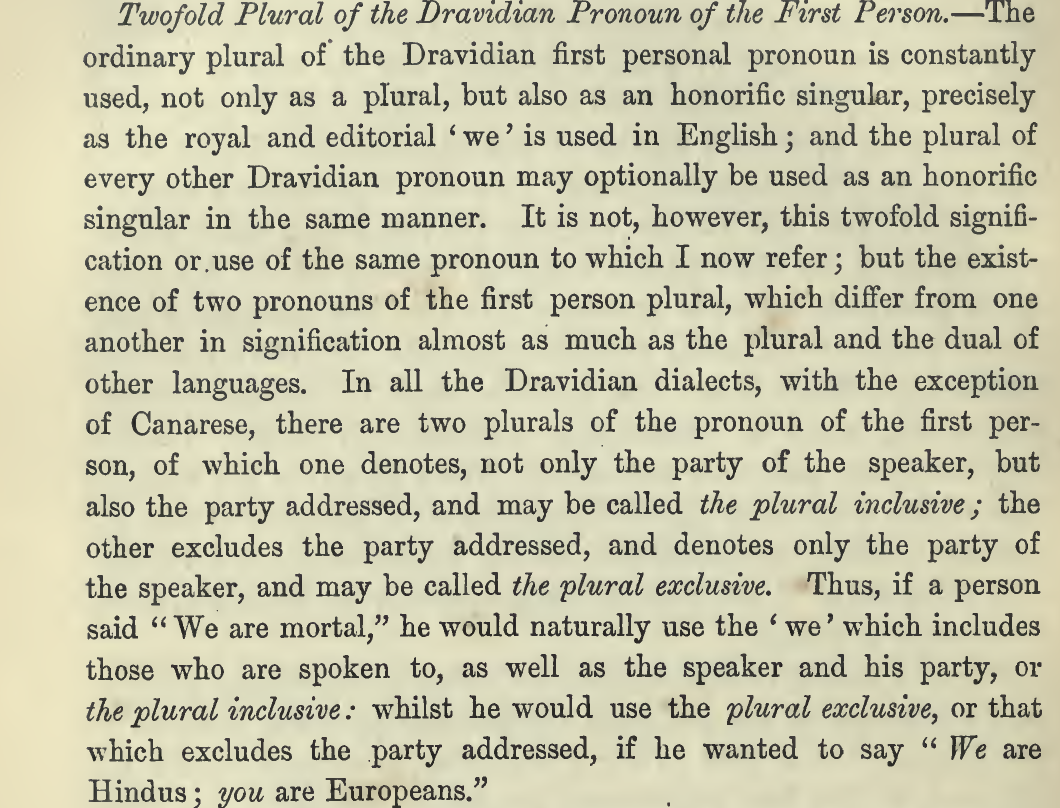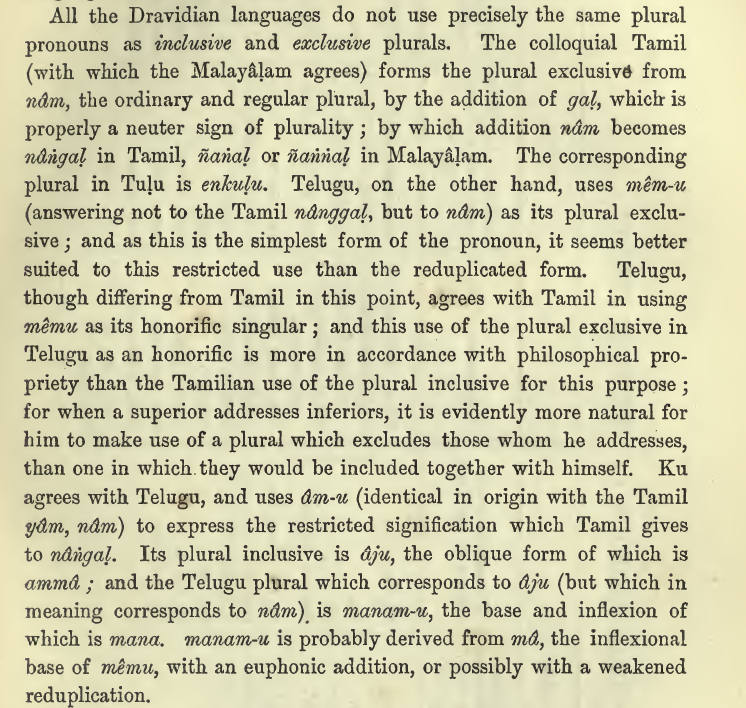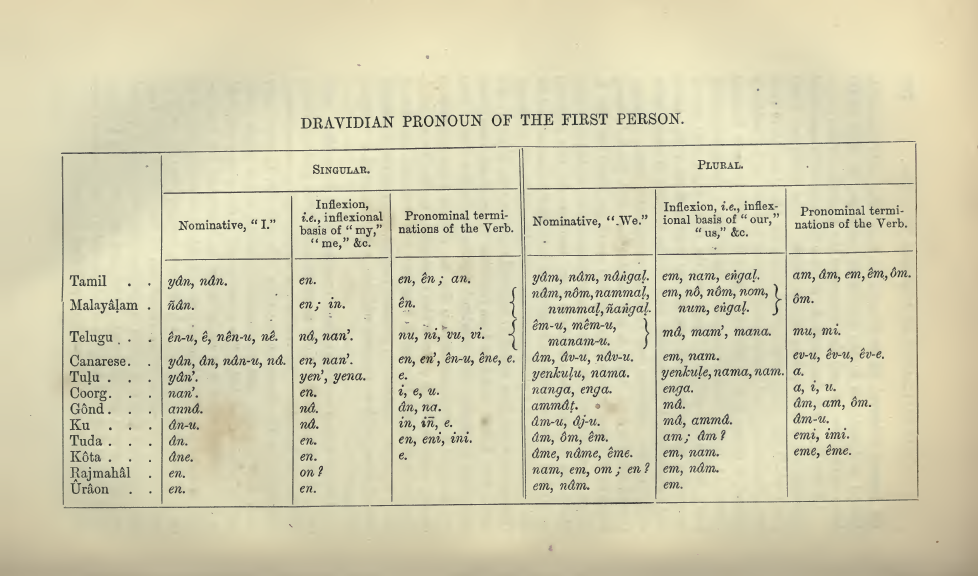Inclusive pronoun in Indian languages
116 views
Skip to first unread message
shankara
Apr 18, 2014, 3:27:27 PM4/18/14
to sams...@googlegroups.com
Pranams to all scholars,
In Malayalam language, there is a special type of pronoun for first person plural. It is known as 'inclusive plural'. In Malayalam it is 'nammal'. Exclusive form of first person plural is 'njangal'.
'nammal' includes the person/persons who is/are addressed to. It is not mere 'we', but 'we' plus 'the audience'.
I would like to know whether such inclusive pronouns are in use in Sanskrit and other Indian languages.
regards
shankara
shankara
Sunder Hattangadi
Apr 18, 2014, 4:56:13 PM4/18/14
to sams...@googlegroups.com
I think in Marathi language this word, 'ApaNa', may fit the bill:
आपण (p. 070) [ āpaṇa ] pron (आत्मा S through अप्पा in बालभाषा) One's self. This is a representative or referential pronoun, standing indifferently for I, thou, he, we, ye, they; or for Myself, thyself, himself, ourselves, yourselves, themselves. Ex. म्यां त्याला जेवूं घातलें मग आ0 जेवायास बसलों; तू मला खटपटींत
लावून आ0 स्वस्थ बसलास; त्यानें चोरी करावी आणि आ0 च चोर चोर म्हणून हाका मारीत सुटावें; and in this manner, through the plural.
2 In the style of majesty or magniloquence, आपण is assumed by the first person singular, bearing the plural significance and regimen of We; and in the reverential or respectful style, it is used in addressing the second person and in designating the third person singular,
exercising the plural government of Ye and They, and conveying the force of such English phrases as Your majesty, Your honor, Your worship, His excellency, His highness &c.
3 आपण rather especially stands for No. 1, the first of the persons, for I or myself, or for We or ourselves. Ex. त्यापाशीं मागितलें असतां तो आपणास देईल.
--
You received this message because you are subscribed to the Google Groups "samskrita" group.
To unsubscribe from this group and stop receiving emails from it, send an email to samskrita+...@googlegroups.com.
To post to this group, send email to sams...@googlegroups.com.
Visit this group at http://groups.google.com/group/samskrita.
For more options, visit https://groups.google.com/d/optout.
You received this message because you are subscribed to the Google Groups "samskrita" group.
To unsubscribe from this group and stop receiving emails from it, send an email to samskrita+...@googlegroups.com.
To post to this group, send email to sams...@googlegroups.com.
Visit this group at http://groups.google.com/group/samskrita.
For more options, visit https://groups.google.com/d/optout.
Arvind_Kolhatkar
Apr 18, 2014, 7:43:36 PM4/18/14
to sams...@googlegroups.com, shankara
In Marathi 'आपण' has this dual sense.
आम्ही जी भाषा बोलतो The language that we speak (here the reference is only 'ourselves' who speak that language).
आपण जी भाषा बोलतो The language that we speak (here the reference is to 'us' and 'you' who speak that language).
(Additionally, आपण is also used as a pronoun indicating a higher degree of respect toward that person addressed. तुम्ही यावे is plain 'please come'', आपण यावे is more respectful 'may you please come'. However, this sense is not relevant to the question asked.)
Arvind Kolhatkar, Toronto, April 18, 2014.
Usha Sanka
Apr 19, 2014, 2:49:31 AM4/19/14
to sams...@googlegroups.com, shankara
Namaste
In Telugu we have both- मेमु (మేము), मनमु (మనము)
मेमु - we all (not you/you all)
मनमु - we all (including you/you all)
मेमु भारतीयुलमु - (మేము భారతీయులము) - we are Indians (to outsiders/ non-Indians- who are excluded in "we")
मनमु भारतीयुलमु - (మనము భారతీయులము) we are Indians (to Indians- who are included in "we" )
Hope it helps.
Thankyou
-Usha
Hnbhat B.R.
Apr 19, 2014, 3:02:40 AM4/19/14
to sams...@googlegroups.com
3647 Ta. nām (obl. nam(m)-) we; nāṅkaḷ we (exclusive).
Ma. nām (obl.nam(m)-) we, I and you.
Ka. nāvu (obl. nam-) we (inclusive) (in Old Ka.;
--
Hnbhat B.R.
Apr 19, 2014, 3:05:35 AM4/19/14
to sams...@googlegroups.com
Koḍ. eŋga (obl. eŋga-), naŋga (obl. naŋga-) we. Tu. eṅkuḷů (obl. eṅkuḷe-) we (excl.). Te. ēmu, nēmu, mēmu (obl. man-/mā-) id. Kol. a·m (obl. am-) id. Nk. ām (obl. am-) id. Nk. (Ch.) ām(e) (obl. am-) we. Pa. ām (obl. am-) id. Ga. (Oll.) ām
shankara
Apr 19, 2014, 3:18:01 AM4/19/14
to sams...@googlegroups.com
Namaste!
Thanks a lot to all scholars who responded to my query. From these replies I understand that languages like Kannada, Telugu, etc also have the exclusive/inclusive first person plural forms whereas languages like Marathi use the same pronoun in both contexts (exclusive as well as inclusive). One has to understand the meaning based on the context. Now, I would like to know if this is the case with Sanskrit too. For instance in the sentence वयं गच्छामः, do we have to recognize based on the context whether 'वयं' is inclusive or exclusive?
From: Hnbhat B.R. <hnbh...@gmail.com>
To: "sams...@googlegroups.com" <sams...@googlegroups.com>
Sent: Saturday, 19 April 2014 12:35 PM
Subject: Re: [Samskrita] Re: Inclusive pronoun in Indian languages
Thanks a lot to all scholars who responded to my query. From these replies I understand that languages like Kannada, Telugu, etc also have the exclusive/inclusive first person plural forms whereas languages like Marathi use the same pronoun in both contexts (exclusive as well as inclusive). One has to understand the meaning based on the context. Now, I would like to know if this is the case with Sanskrit too. For instance in the sentence वयं गच्छामः, do we have to recognize based on the context whether 'वयं' is inclusive or exclusive?
regards
shankara
shankara
From: Hnbhat B.R. <hnbh...@gmail.com>
To: "sams...@googlegroups.com" <sams...@googlegroups.com>
Sent: Saturday, 19 April 2014 12:35 PM
Subject: Re: [Samskrita] Re: Inclusive pronoun in Indian languages
Hnbhat B.R.
Apr 19, 2014, 5:09:52 AM4/19/14
to sams...@googlegroups.com
Here is the reply given precisely by Caldwell:






The above shows in other Dravidian Languages, the different forms of FIRST PERSON PLURAL forms in a table and the page above explains the term 'obliqe" used in TN Burrows comparative Dictionary I had already given the forms exclusive and inclusive.
I have enclosed relevant 3 pages for reading as it also includes the two fold distinction in Marathi and Gujerathi with its relation to other Indo- European languages which is different from Dravidian :Languages. A search for exclusive and inclusive in E M Burrow's Comparative Dravidian Languages' Dictionary will yield a similar Table of both the forms:
Similar search in Turner's Comparative Dictionary brings a similar result of distinction of personal pronoun in Gujarati and Marathi derived from Sanskrit
. ātmán : (page 51)
2nd sg. pron. ʼ; Or. āpe ʻ self ʼ, āpaṇ ʻ you (respectful) ʼ; OMth. āpa ʻ self ʼ, inst. apanai (> mod. apani), gen. apana, OAw. āpu; H. āp ʻ self, resp. 2nd sg. pron. ʼ; OMarw. āpa ʻ self, you (honorific), we (inclusive) ʼ; G. āpũ n. ʻ individuality, pride ʼ, āp ʻ self, you (resp.) ʼ, āpaṇ ʻ we (inclusive) ʼ, āpas mã̄ ʻ among our-- or your-- or themselves ʼ; M. āp n. ʻ self ʼ, āpaṇ ʻ oneself ʼ. āpsā adv. ʻ one another ʼ,
2. ātmán : (page 51)
inst. apanai (> mod. apani), gen. apana, OAw. āpu; H. āp ʻ self, resp. 2nd sg. pron. ʼ; OMarw. āpa ʻ self, you (honorific), we (inclusive) ʼ; G. āpũ n. ʻ individuality, pride ʼ, āp ʻ self, you (resp.) ʼ, āpaṇ ʻ we (inclusive) ʼ, āpas mã̄ ʻ among our-- or your-- or themselves ʼ; M. āp n. ʻ self ʼ, āpaṇ ʻ oneself ʼ. āpsā adv. ʻ one another ʼ, āplā ʻ own ʼ; Ko. āppaṇa ʻ self ʼ; Si. ata ʻ self, individuality ʼ (api ʻ we
Hope this answers the later query of Sankar in his recent message and complete answer to his first question.
shankara
Apr 19, 2014, 5:44:42 AM4/19/14
to sams...@googlegroups.com
Bhat Sir,
Thank you very much for the explanation and link to Burrow's dictionary. Could you please confirm the existence or non-existence of inclusive pronoun in Sanskrit?
Thank you very much for the explanation and link to Burrow's dictionary. Could you please confirm the existence or non-existence of inclusive pronoun in Sanskrit?
regards
shankara
shankara
Sent: Saturday, 19 April 2014 2:39 PM
Subject: Re: [Samskrita] Re: Inclusive pronoun in Indian languages
Hnbhat B.R.
Apr 19, 2014, 7:21:24 AM4/19/14
to sams...@googlegroups.com
On Sat, Apr 19, 2014 at 3:14 PM, shankara <shanka...@yahoo.com> wrote:
Bhat Sir,
Thank you very much for the explanation and link to Burrow's dictionary. Could you please confirm the existence or non-existence of inclusive pronoun in Sanskrit?
Probably there is not such a distinction as I could not get the word "inclusive" in Turner's dictionary in any of the Sanskrit Pronouns. But only in the usage of Prakrit originated languages, including Gujarathi and Marati, the use of derivative of आत्मन् अप्पा, आप अप्पणा as already explained. There is a clear usage of vayam for both;
परस्परविवादे तु वयं पञ्च शतं च ते।
अन्यैः सह विवादे तु वयं पञ्चोत्तरं शतम्॥
already discussed in our group alrleady
With regards,
dhaval patel
Apr 19, 2014, 12:42:39 AM4/19/14
to samskrita
gujarati - ame - we exclusive of listener
ApaNe - we inclusive of listener.
--
You received this message because you are subscribed to the Google Groups "samskrita" group.
To unsubscribe from this group and stop receiving emails from it, send an email to samskrita+...@googlegroups.com.
To post to this group, send email to sams...@googlegroups.com.
Visit this group at http://groups.google.com/group/samskrita.
For more options, visit https://groups.google.com/d/optout.
shankara
Apr 19, 2014, 7:57:45 AM4/19/14
to sams...@googlegroups.com
Bhat Sir,
Thank you very much for providing the example of वयं पञ्चोत्तरं शतम्. Now it is clear to me.
Thank you very much for providing the example of वयं पञ्चोत्तरं शतम्. Now it is clear to me.
regards
shankara
shankara
Sent: Saturday, 19 April 2014 4:51 PM
Subject: Re: [Samskrita] Re: Inclusive pronoun in Indian languages
shankara
Apr 19, 2014, 8:01:10 AM4/19/14
to sams...@googlegroups.com
Patelji,
Thanks for sharing the information. I would like to know if 'ApaNe' is used in that context only? I am asking this because in Marathi the inclusive pronoun आपण (we all) is also used in other contexts to mean 'you' as explained in Kolhatkarji's mail.
From: dhaval patel <drdhav...@gmail.com>
To: samskrita <sams...@googlegroups.com>
Sent: Saturday, 19 April 2014 10:12 AM
Thanks for sharing the information. I would like to know if 'ApaNe' is used in that context only? I am asking this because in Marathi the inclusive pronoun आपण (we all) is also used in other contexts to mean 'you' as explained in Kolhatkarji's mail.
regards
shankara
shankara
From: dhaval patel <drdhav...@gmail.com>
To: samskrita <sams...@googlegroups.com>
Sent: Saturday, 19 April 2014 10:12 AM
Subject: Re: [Samskrita] Re: Inclusive pronoun in Indian languages
Hnbhat B.R.
Apr 19, 2014, 9:25:11 AM4/19/14
to sams...@googlegroups.com
There is another usage of the plural of First Person, for honorific purposes:
विश्वम्भरा भगवती भवतीमसूत राजा प्रजापतिसमो जनकः पिता ते /
तेषां वधूस्त्वमसि नन्दिनि पार्थिवानां येषां गृहेषु सविता च गुरुर्वयं च //९//
even in singular or duel cases.
"अस्मदो द्वयोश्च॥ १।२।५९" अहं ब्रवीमि, आवां ब्रूवः- in both cases, वयं ब्रूमः can be used even though speakers can one or two.
In the above case of उत्तररामचरित, सविता गुरुः, वयं च। [गुरवः]
referring to वसिष्ठ himself. This is also borrowed in Malayalam language. and probably in other Indian languages too. There is another वार्तिक, "पूजायां बहुवचनम्" which makes plural for any one, we respect even though it is not pronoun.
Reply all
Reply to author
Forward
0 new messages
